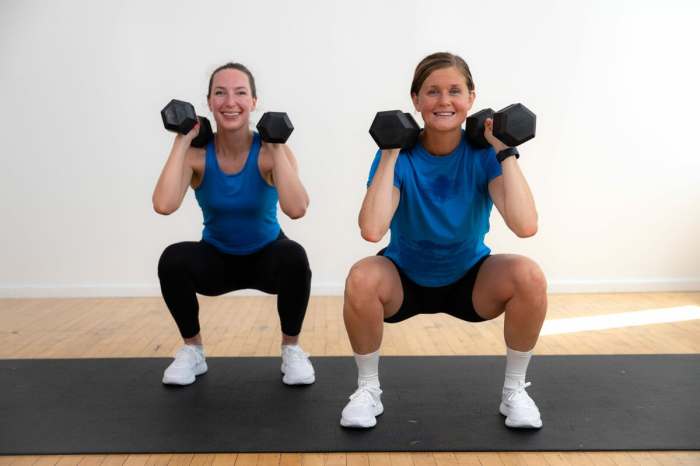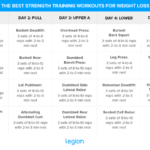Strength Training Women: Unlocking physical and mental power through targeted exercise is more than just building muscle; it’s about forging resilience, boosting confidence, and optimizing overall well-being. This guide delves into the myriad benefits of strength training for women, debunking common myths, and providing practical strategies for building a safe and effective program. From designing personalized workouts to understanding nutritional needs, we explore every facet of empowering women through strength.
We’ll examine the physiological advantages, such as increased bone density and metabolic rate, alongside the psychological benefits, including enhanced self-esteem and stress reduction. We’ll also address common concerns, like injury prevention and the misconception that strength training leads to bulkiness. The guide culminates in actionable plans, including sample workout routines and meal plans, designed to help women of all ages and fitness levels embark on their strength-building journey.
Benefits of Strength Training for Women

Strength training offers a multitude of advantages for women across all ages and fitness levels, significantly impacting both physical and mental well-being. Far beyond simply building muscle, it provides a robust foundation for improved health and longevity. This section details the key physiological and psychological benefits, comparing them to other forms of exercise and illustrating their impact on overall health.
Physiological Benefits of Strength Training
Strength training profoundly impacts women’s physiology. It leads to increased bone density, mitigating the risk of osteoporosis, a significant concern for women, particularly post-menopause. Studies consistently demonstrate that weight-bearing exercises stimulate bone growth and reduce bone loss. Furthermore, strength training elevates the metabolic rate, contributing to weight management and improved body composition. Increased muscle mass burns more calories at rest, even when inactive, leading to a more efficient metabolism and making weight loss easier to maintain.
This is a key advantage over solely cardio-based exercise regimes.
Psychological Benefits of Strength Training, Strength Training Women
Beyond the physical advantages, strength training significantly enhances psychological well-being. The accomplishment of progressively challenging workouts fosters increased self-esteem and confidence. The release of endorphins during exercise acts as a natural mood booster, reducing stress and anxiety. This positive feedback loop contributes to a more positive self-image and improved mental resilience. Many women report feeling empowered and more in control of their bodies after embarking on a strength training program.
Comparison to Other Forms of Exercise
While cardiovascular exercise is crucial for heart health, strength training offers unique benefits that complement cardio. Cardio primarily improves cardiovascular fitness, while strength training builds muscle mass, increases bone density, and boosts metabolism. A well-rounded fitness program ideally incorporates both, maximizing the benefits for overall health. For example, a runner might add strength training to prevent injuries and improve performance, while a woman focused on weight loss might find strength training more effective for long-term fat loss due to its metabolic impact.
Improved Overall Health and Well-being
Strength training’s impact on overall health is multifaceted. It reduces the risk of chronic diseases such as type 2 diabetes, heart disease, and some cancers. Improved posture and balance reduce the risk of falls and injuries, particularly important as women age. The increased energy levels and improved mood contribute to a higher quality of life. For example, a woman managing arthritis might find strength training helps alleviate pain and improve joint mobility.
Benefits Across Different Age Groups
| Age Group | Bone Density | Metabolic Rate | Psychological Well-being |
|---|---|---|---|
| Young Adults (18-35) | Builds strong bone mass, establishing a foundation for future bone health. | Increases metabolic rate, supporting healthy weight management. | Enhances self-esteem, confidence, and body image. |
| Middle-Aged Adults (36-55) | Helps maintain bone density, mitigating age-related bone loss. | Supports weight management and combats age-related metabolic slowdown. | Reduces stress, improves mood, and combats age-related anxiety. |
| Older Adults (55+) | Significantly reduces risk of osteoporosis and fractures, improving mobility and independence. | Helps maintain a healthy weight and improves overall physical function. | Boosts self-esteem, reduces feelings of isolation, and improves overall quality of life. |
Common Myths and Misconceptions
Strength training for women is often shrouded in misinformation, leading many to shy away from its incredible benefits. These misconceptions, stemming from outdated stereotypes and a lack of accurate information, prevent countless women from reaping the rewards of increased strength, improved bone density, and enhanced overall well-being. Addressing these myths is crucial to promoting a more inclusive and accurate understanding of strength training’s positive impact on women’s health.Many women believe that lifting weights will make them bulky and masculine.
This is a pervasive myth. Women naturally have significantly lower levels of testosterone than men, the hormone primarily responsible for muscle growth. While strength training will build muscle, it’s unlikely to result in the bulky physique often associated with male bodybuilders. Instead, women will likely see improvements in muscle tone, definition, and overall strength, leading to a leaner, more athletic physique.
The focus should be on functional strength and overall fitness, not maximizing muscle mass.
Strength Training and Body Type
The idea that strength training is only suitable for certain body types is entirely false. Women of all shapes and sizes can, and should, benefit from incorporating strength training into their fitness routines. Regardless of starting point, a well-structured program, tailored to individual needs and capabilities, will deliver positive results. Body composition, rather than a specific body type, is a more accurate predictor of success.
A woman with a higher body fat percentage may see a greater reduction in body fat through strength training, while a leaner woman may see more pronounced increases in muscle mass. The key is consistency and a properly designed program.
Addressing the Fear of Injury
The fear of injury is a legitimate concern, but it shouldn’t deter women from strength training. Proper technique is paramount to mitigating risk. Starting with lighter weights, focusing on correct form, and gradually increasing the weight and intensity as strength improves are essential. Seeking guidance from a qualified personal trainer or fitness professional can significantly reduce the chance of injury.
They can assess individual needs, demonstrate proper form, and create a safe and effective training plan. Furthermore, incorporating adequate rest and recovery into the training schedule is vital for muscle repair and injury prevention. Listening to your body and taking rest days when needed is crucial.
Strategies to Encourage Participation
Overcoming the myths surrounding women and strength training requires a multifaceted approach. Promoting positive role models and showcasing the diverse range of women who benefit from strength training can help dispel negative stereotypes. Educating women about the benefits, addressing their concerns, and providing accessible resources are also critical. This includes offering beginner-friendly programs, creating supportive community environments, and highlighting the long-term health advantages, including improved metabolism, stronger bones, and reduced risk of chronic diseases.
The emphasis should always be on empowering women to take control of their fitness journey and embrace the transformative power of strength training.
Nutrition and Recovery for Strength Training Women

Optimizing nutrition and recovery is paramount for women engaged in strength training. A well-structured approach ensures muscle growth, prevents injury, and maximizes performance gains. This section details the crucial elements of a supportive nutritional strategy and recovery plan for women striving for strength and fitness improvements.
Macronutrient Needs for Strength Training Women
Meeting the increased energy demands of strength training requires a balanced intake of macronutrients: protein, carbohydrates, and fats. Protein fuels muscle growth and repair, carbohydrates provide energy for workouts, and fats support hormone production and overall health. The specific ratios vary based on individual factors like training intensity, body composition goals, and overall activity levels. However, a general guideline for strength training women suggests a higher protein intake compared to sedentary individuals.
The Role of Protein in Muscle Growth and Repair
Protein is the primary building block of muscle tissue. Sufficient protein intake is essential for muscle protein synthesis, the process by which your body builds and repairs muscle fibers after intense training. A general recommendation is to consume 1.6-2.2 grams of protein per kilogram of body weight daily for women actively engaged in strength training. This can be achieved through a variety of protein sources, including lean meats, poultry, fish, eggs, dairy products, legumes, and plant-based protein powders.
Carbohydrate Intake for Energy and Performance
Carbohydrates are the body’s preferred energy source, particularly during intense exercise. Adequate carbohydrate intake ensures sufficient glycogen stores in muscles, preventing fatigue and optimizing workout performance. Carbohydrate needs vary depending on training volume and intensity; women engaging in heavy strength training may require higher carbohydrate intake than those with lighter routines. Choose complex carbohydrates like whole grains, fruits, and vegetables over refined carbohydrates for sustained energy release and better overall health.
The Importance of Healthy Fats for Hormone Production and Overall Well-being
Healthy fats are crucial for hormone production, particularly those involved in muscle growth and recovery. They also support overall health and well-being. Incorporate sources like avocados, nuts, seeds, and olive oil into your diet. Avoid excessive consumption of saturated and trans fats.
Hydration and Sleep: Essential Components of Recovery
Adequate hydration is crucial for optimal muscle function and recovery. Water helps transport nutrients, regulate body temperature, and remove waste products. Aim for consistent hydration throughout the day, increasing fluid intake before, during, and after workouts. Sleep is equally important; it’s during sleep that the body repairs and rebuilds muscle tissue. Aim for 7-9 hours of quality sleep each night to optimize recovery and promote muscle growth.
Example Pre- and Post-Workout Meals
Pre-workout: A small, easily digestible meal or snack 1-2 hours before training, such as a banana with a handful of almonds, or a Greek yogurt with berries. This provides sustained energy without causing digestive discomfort. Post-workout: A meal or snack within 30-60 minutes post-workout, combining protein and carbohydrates to replenish glycogen stores and promote muscle repair. Examples include a chicken breast salad with quinoa or a protein smoothie with fruit and oats.
Sample Weekly Meal Plan for a Strength Training Woman
| Day | Breakfast | Lunch | Dinner |
|---|---|---|---|
| Monday | Oatmeal with berries and nuts | Chicken salad sandwich on whole-wheat bread | Salmon with roasted vegetables |
| Tuesday | Greek yogurt with fruit and granola | Lentil soup with whole-wheat bread | Lean beef stir-fry with brown rice |
| Wednesday | Scrambled eggs with spinach and whole-wheat toast | Tuna salad with avocado on whole-wheat crackers | Chicken breast with sweet potato and broccoli |
| Thursday | Smoothie with protein powder, fruit, and spinach | Leftover chicken and vegetables | Vegetarian chili with cornbread |
| Friday | Whole-wheat pancakes with fruit and syrup | Turkey breast and avocado wrap | Pork tenderloin with roasted asparagus |
| Saturday | Breakfast burrito with eggs, beans, and vegetables | Leftover vegetarian chili | Pizza with whole-wheat crust and plenty of vegetables |
| Sunday | French toast with fruit and a side of bacon | Salad with grilled chicken or fish | Pasta with marinara sauce and lean ground turkey |
Ultimately, strength training isn’t just about physical transformation; it’s about empowering women to take control of their health and well-being. By understanding the benefits, dispelling the myths, and adopting a well-structured program, women can harness the transformative power of strength training to achieve their fitness goals and live healthier, more fulfilling lives. This comprehensive guide provides the tools and knowledge necessary to embark on this empowering journey, fostering confidence and resilience along the way.
Remember to consult a healthcare professional before starting any new exercise program.

